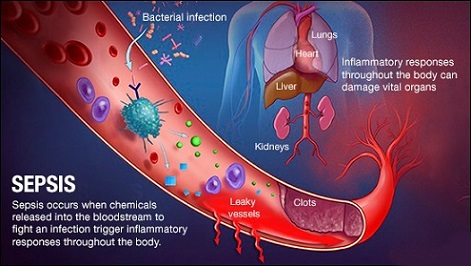Clinical Practice: New Study Shows That A Combination Of Hydrocortisone And Fludrocortisone Is Better At Treating Septic Shock
Clinical Practice - Hydrocortisone And Fludrocortisone - Sepsis Mar 28, 2023 2 years, 4 weeks, 18 hours, 45 minutes ago
Clinical Practice: A new study by researchers from the Boston University Chobanian & Avedisian School of Medicine-USA, University of Toronto-Canada has found that a combination of hydrocortisone and fludrocortisone is better at treating septic shock.

The study findings are of relevance in this COVID-19 era where it has been found that many hospitalized COVID-19 with disease severity often develop septic shock in the late stages.
In this multicenter cohort study among 88 275 patients with septic shock receiving norepinephrine who initiated hydrocortisone treatment, the addition of fludrocortisone to hydrocortisone was associated with a 3.7% lower adjusted absolute risk difference in the primary composite outcome of mortality or discharge to hospice compared with initiation of hydrocortisone alone.
While it has already been known that patients with septic shock may benefit from the initiation of corticosteroids, the comparative effectiveness of the 2 most studied corticosteroid regimens (hydrocortisone with fludrocortisone vs hydrocortisone alone) is unclear.
The study team aimed to compare the effectiveness of adding fludrocortisone to hydrocortisone vs hydrocortisone alone among patients with septic shock using target trial emulation.
The retrospective cohort study from 2016 to 2020 used the enhanced claims-based Premier Healthcare Database, which included approximately 25% of US hospitalizations. Participants were adult patients hospitalized with septic shock and receiving norepinephrine who began hydrocortisone treatment. Data analysis was performed from May 2022 to December 2022.
The study’s exposure was the addition of fludrocortisone on the same calendar day that hydrocortisone treatment was initiated vs use of hydrocortisone alone.
Measured main outcomes were composite of hospital death or discharge to hospice. Adjusted risk differences were calculated using doubly robust targeted maximum likelihood estimation.
The study analysis included 88 275 patients, 2280 who began treatment with hydrocortisone-fludrocortisone (median [IQR] age, 64 [54-73] years; 1041 female; 1239 male) and 85 995 (median [IQR] age, 67 [57-76] years; 42 136 female; 43 859 male) who began treatment with hydrocortisone alone. The primary composite outcome of death in hospital or discharge to hospice occurred among 1076 (47.2%) patients treated with hydrocortisone-fludrocortisone vs 43 669 (50.8%) treated with hydrocortisone alone (adjusted absolute risk difference, −3.7%; 95% CI, −4.2% to −3.1%; P < .001).
The study findings showed that among adult patients with septic shock who began hydrocortisone treatment, the addition of fludrocortisone was superior to hydrocortisone alone.
The study findings were published in the peer reviewed journal JAMA Internal Medicine.
https://jamanetwork.com/journals/jamainternalmedicine/article-abstract/2802801
Sepsis is the body's extreme response to an infection. It is a life-threatening medical emergency. Sepsis happens when an infection you already have triggers a chain reaction throughout your body.
Infections that lead to sepsis most often start in the lung, urinary tract, skin, or gastrointestinal tract and can lead to tissue damage, organ failure, and death.
To date, reports show that sepsis occurs in approximately 1.7 million hospitalizations in the U.S. with more than a third of hospitalizations resulting in death.
Typically, patients with septic shock benefit from steroid medications (corticosteroids) to reduce shock duration and potentially decrease the chance of dying. However, it is unclear if one of the two main frequently used steroid regimens (hydrocortisone alone versus hydrocortisone and fludrocortisone together) is better than the other regimen.
The study findings form this study shows that patients receiving a combination of hydrocortisone and fludrocortisone had lower death rates and discharge to hospice compared to those who only received hydrocortisone.
Corresponding author, Dr Nicholas Bosch MD, MSc, an assistant professor of medicine at Boston University Chobanian & Avedisian School of Medicine said, “Our study findings provide robust evidence that one steroid regimen is superior to the other regimen and, in absence of further clinical trials, directly inform the choice of steroids in patients with septic shock."
In order to compare the effectiveness of both treatment regimens, the study team used a large multicenter database made up of approximately 25% of U.S. hospitalizations and an observational study design that was intended to mimic a randomized clinical trial to compare the outcome of death or discharge to hospice between patients who received the regimen of hydrocortisone and fludrocortisone to those who received hydrocortisone alone.
The study team found that the regimen of hydrocortisone and fludrocortisone together was superior to hydrocortisone alone; on average, patients who received hydrocortisone and fludrocortisone died or were discharged to hospice approximately four percent less of the time compared to patients who received hydrocortisone alone.
The study team says these findings may change
Clinical Practice.
Dr Bosch, who also is a pulmonologist at Boston Medical Center added, "It is possible that guideline recommendations, which currently suggest to start hydrocortisone alone, will change as a result of this study."
The study team believes this study has additional implications due to its use of target trial emulation, a modern approach to comparative effectiveness studies using observational data ("big" electronic health record data) that is designed to mimic a prospective randomized controlled trial.
D Bosch commented, "These target trial emulations are likely to be seen with increasing frequency going forward as "big data" becomes more and more available and have the potential to answer complex clinical questions in situations where a randomized clinical trial may not be feasible.”
For the latest updates on
Clinical Practice, keep on logging to Thailand Medical News.
